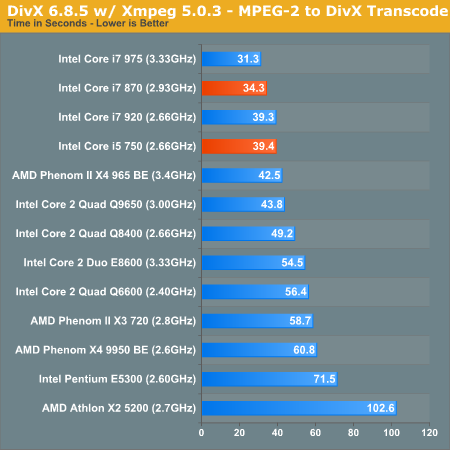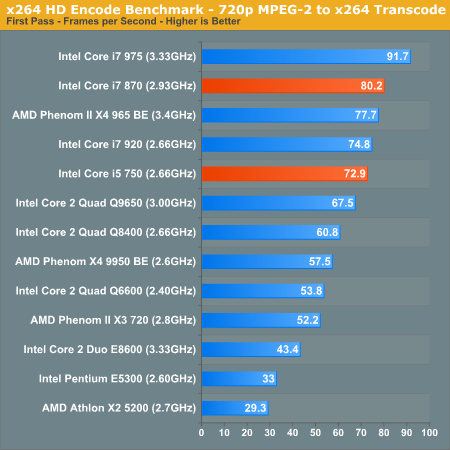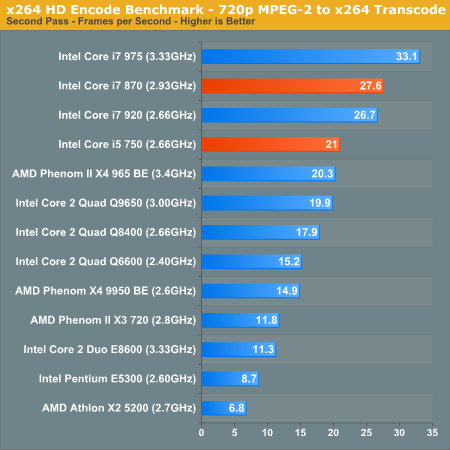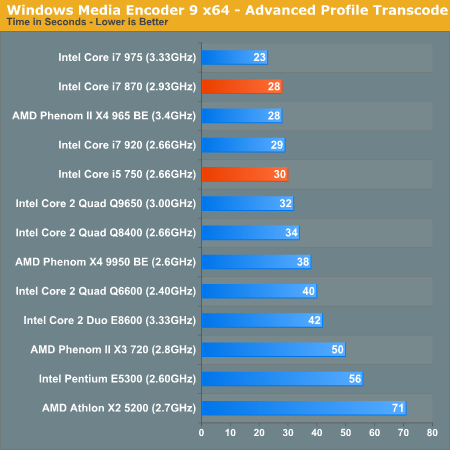Intel's Core i7 870 & i5 750, Lynnfield: Harder, Better, Faster Stronger
by Anand Lal Shimpi on September 8, 2009 12:00 AM EST- Posted in
- CPUs
DivX 8.5.3 with Xmpeg 5.0.3
Our DivX test is the same DivX / XMpeg 5.03 test we've run for the past few years now, the 1080p source file is encoded using the unconstrained DivX profile, quality/performance is set balanced at 5 and enhanced multithreading is enabled:

And we're done. DivX, historically a stronghold for AMD's Phenom II processors (at least compared to their price-competitive Penryn counterparts) is faster on the Core i5 750 than on the Phenom II X4 965 BE. What's wrong with that?
The i5 750 costs $199, the 965 BE costs $245. Intel is selling you more transistors for less than AMD is for once.
x264 HD Video Encoding Performance
Graysky's x264 HD test uses the publicly available x264 codec (open source alternative to H.264) to encode a 4Mbps 720p MPEG-2 source. The focus here is on quality rather than speed, thus the benchmark uses a 2-pass encode and reports the average frame rate in each pass.

In the first pass AMD is quite competitive, outpacing the i5 750, but when we get to the actual encode:

It's close, but the cheaper i5 750 is faster than the Phenom II X4 965 BE once again; Hyper Threading keeps the i7 920 ahead.
Windows Media Encoder 9 x64 Advanced Profile
In order to be codec agnostic we've got a Windows Media Encoder benchmark looking at the same sort of thing we've been doing in the DivX and x264 tests, but using WME instead.

AMD is about 6% faster than the i5 750 here, it looks like the Phenom II does have some hope left for it. Let's see how the rest unfolds...










343 Comments
View All Comments
Gary Key - Wednesday, September 9, 2009 - link
Actually the manufacturers wanted Clarkdale desperately for the school/holiday shopping seasons. It is delayed as they are still debugging the platform, unofficially I think that means the drivers are not ready. ;) Believe me, if we had a stable Clarkdale platform worthy of a preview, you would have read about it already.justme2009 - Wednesday, September 9, 2009 - link
You are incorrect sir. The manufacturers were complaining to Intel that they couldn't get rid of the current stock before Intel released mobile Nehalem, so Intel caved.http://techreport.com/discussions.x/16152">http://techreport.com/discussions.x/16152
http://www.techspot.com/news/33065-notebook-vendor...">http://www.techspot.com/news/33065-note...-pushing...
http://www.brighthub.com/computing/hardware/articl...">http://www.brighthub.com/computing/hardware/articl...
http://gizmodo.com/5123632/notebook-makers-want-in...">http://gizmodo.com/5123632/notebook-mak...o-delay-...
Needless to say, I'm waiting for mobile Nehalem (clarkdale/arrendale). With a 32nm manufacturing process, plus starting in 2010, Intel will begin to move both the northbridge and southbridge chips onto the processor die. The move should complete some time around 2011 as far as I can tell.
It will be far better than what we have today, and I'm really ticked off at the manufacturers for holding back progress because of their profit margin.
Gary Key - Wednesday, September 9, 2009 - link
I spoke directly with the manufacturers, not unnamed sources. The story is quite different than the rumors that were posted. I will leave it at that until we product for review.justme2009 - Wednesday, September 9, 2009 - link
Of course the manufacturers wouldn't fess up to it. It's bad business, and it makes them look bad. It already angered a great many people. I don't think they are rumors at all.justme2009 - Wednesday, September 9, 2009 - link
Personally I'm holding off on buying a new system until the northbridge/southbridge migration to the processor die is complete, ~2 years from now. That will definitely be the time to buy a new system.ClagMaster - Tuesday, September 8, 2009 - link
“These things are fast and smart with power. Just wait until Nehalem goes below 65W...”I surely will Mr Shimpi with this exceptional processor. I am going to wait until the summer of 2010 when prices are the lowest, rebates are the sweetest, before I buy my i7 860. By that time, hopefully, there would be 65W versions available on improved stepping. It’s worth the wait.
I would wager the on-chip PCIe controller could use some additional optimization which would result in lower power draw for a given frequency.
Intel sure delivered the goods with Lynnfield.
cosminliteanu - Tuesday, September 8, 2009 - link
Well done Anandtech for this article... :)ereavis - Tuesday, September 8, 2009 - link
great article. Good replies to all the bashing, most seem to have misread.Now, we want to see results in AnandTech Bench!
MODEL3 - Tuesday, September 8, 2009 - link
Wow, the i5 750 is even better than what i was expecting...For the vast, vast majority of the consumers, (not enthusiasts, overclocking guys, etc...) with this processor Intel effectively erased the above 200$ CPU market...
I hope this move to have the effect to kill their ASP also... (except AMDs...) (not that this will hurt Intel much with so many cash, but it is better than nothing...)
I see that the structure/composition in this review and in many others tech sites reviews is very good, maybe this time Intel helped more in relation with the past regarding info / photos / diagrams / review guide etc...
One question that i have (out of the conspiracy book again...) is,
if the integration of the PCI-Express controller in the CPU die on the mainstream LGA-1156 platform will be a permanent strategy from now on...
and if the recent delay for the PCI-Express standard 3.0 has a connection with the timing of the launch of mainstream LGA-1156 based CPUs with PCI-Express 3.0 controller integrated...
Sure, they can launch future LGA-1156 motherboard chipsets with PCI-Express 3.0 controller, but doesn't this contradict the integration strategy that Intel just started with the new processors?
MODEL3 - Tuesday, September 8, 2009 - link
I can't edit...I just want to clarify that the PCI-Express 3.0 question is for LOL reasons, not taken serious...